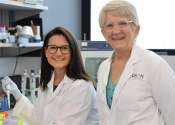Study reveals lower survival rates for women than men with germ cell tumors
Women with a type of ovarian cancer known as germ cell tumors have a worse prognosis than men with similar tumors (i.e., testicular cancer). After five years with the disease, 98% of men were alive while the survival rate ...
Mar 12, 2024
0
0









